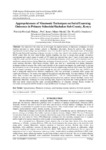| dc.description.abstract | The objective of this study was to investigate the appropriateness of Mnemonic techniques on serial
learning outcomes in upper primary schools in Machakos sub-county, Kenya.To achieve this, factorial experimental research design was used. Schools were first stratified into three educational zones of Machakos
Sub-County. Purposeful sampling technique was used to select four schools with similar mean grades in 2017
KCPE exams from the three zones. Simple random sampling was used to assign intact groups (streams)to
experimental and control groups. A sample of 317 pupils was selected from class 7 pupils to participate in the
study.The study used the following research instruments:
Questionnaires which were used to measure level of
satisfaction among learners during Mnemonic techniques treatment process. Tests which were used to measure
serial learning outcomes. Observation schedule which was used as a monitoring tool during Mnemonic
techniques treatment process. The validity and reliability of the research instruments was established by piloting
the instruments in one of the primary school selected from the neighbouring Kathiani Sub-County. The reliability
of the research instrument was determined through the split-half correlation method. Two-way ANOVA was
used to analysethe data.Post-hoc Pairwise comparison (LSD) was performed to establish which groups had
significant differences. The results were analyzed descriptively and inferentially. The main findings of the study
were; Data revealed that significant differences(F(3,317)= 4.70, P< 0.05) existed between learners using
Mnemonic techniques in relation to serial learning outcomes. Post-hoc analysis showed that Music was the most
appropriate Mnemonic technique for serial learning tasks, Pegword, keyword and control group were second,
third and fourth respectively. The study recommended Ministry of education through Kenya institute of
curriculum development (KICD) should in cooperate Mnemonic techniques in the curriculum. | en_US |

